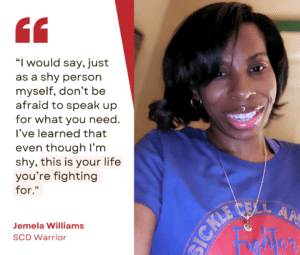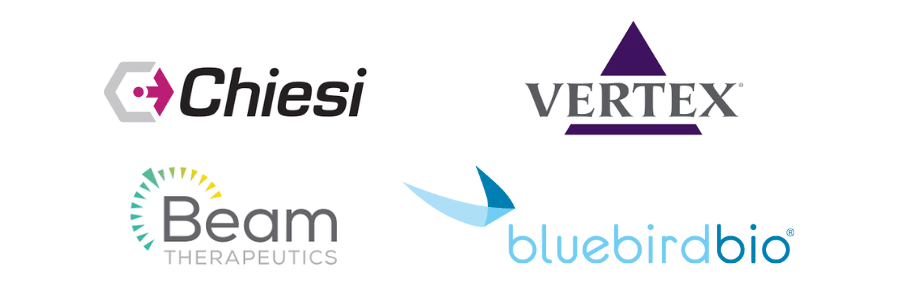It’s Your Health Journey: Self-Advocacy in the ER
 Within the sickle cell disease (SCD) community, the word advocacy is one that’s used often. Even at the root of Sick Cells lies the importance of advocating for one another. It’s how we fulfill our mission to push forward policies to ultimately improve the quality of life and care for people living with SCD. We can advocate for ourselves, each other, and the systems we want to change.
Within the sickle cell disease (SCD) community, the word advocacy is one that’s used often. Even at the root of Sick Cells lies the importance of advocating for one another. It’s how we fulfill our mission to push forward policies to ultimately improve the quality of life and care for people living with SCD. We can advocate for ourselves, each other, and the systems we want to change.
But advocacy can be complicated – especially when it comes to advocating for yourself in tough situations. For sickle cell warriors, this often looks like time spent in the emergency room (ER). You’ve done all you can at home to minimize a crisis, but it’s not enough. So you pack your things, get yourself to the ER, and hope to relieve the pain as soon as possible. Sometimes the process at the ER is fast and other times, you’re left feeling misunderstood. It’s a story we’ve heard often at Sick Cells, which is why we spoke with Jemela Williams, a sickle cell warrior, about the importance of self-advocacy and how she helps herself and fellow community members advocate for themselves in tough situations.
Advocacy and the ER
From the nursing shortage largely driven by the COVID-19 pandemic to the overall unfamiliarity of rare diseases like sickle cell, there are a handful of reasons why those living with SCD may find themselves up against a rigid health care system that can make self-advocacy difficult.
“They [the ER department] didn’t have the resources for some reason or the other,” said Williams after she found herself in the ER with a sickle cell crisis. “They just were full and there were no beds available…It seemed like they were moving as fast as they could.”
While Jemela shared that her experiences in the ER have never been significantly negative, she couldn’t say the same for her peers, which is why she’s taken it upon herself to be an advocate for others.
“I use my social media as a means to bridge the gap and use my voice to reach out, and as a means to give [sickle cell warriors] a voice,” said Williams. “Reaching out to hospitals as much as I possibly can, I’ve had people reach out to me through Twitter and ask for help. I’ve always wanted to start an organization for those people that don’t have people to advocate for them because I’ve always been fortunate enough to always have my mom there, or a friend, a family member or something.”
Jemela’s courage and helping hands have stretched far within the sickle cell community. Her passion for coaching others on how to be self-advocates is more important than ever, especially as hospitals continue to limit visitors amid local peaks in COVID-19 cases. In fact, she encourages others to speak out about their negative experiences whether it be via social media or in a written letter to hospital administrators.
“I try as much as I can to reach out with my voice when people are not doing what they should be [doing],” said Williams. “I think it’s important to call these hospitals out and let them know ‘hey, we see what you’re doing and we’re going to talk about it and make it publicly known.’”
It’s Your Health Journey
For Jemela, the difference between staying quiet or advocating for yourself as a sickle cell warrior in the ER can be life or death.
“It doesn’t bode well that you have sickle cell disease patients waiting for three plus hours for help and pain medications during the sickle cell crisis,” said Williams. “That’s wrong, scary, and life threatening. We can work to change this.”
And a community of advocates is what it will take to make this change. In fact, it took Jemela addressing a large public hospital via Twitter to jumpstart better treatment for sickle cell patients in the ER. Her message to the hospital was clear, actionable, and cut straight to the point: sickle cell disease patients deserve a better standard of care.

Jemela’s message sparked a flurry of supportive comments from other warriors, advocates, and healthcare professionals, eventually leading to a positive and productive response from the hospital; they invited her to speak with the patient relations team to come up with a resolution. What seemed like a simple tweet drove meaningful change for, hopefully, all future sickle cell warriors who visit that hospital. It stands out as a clear example of the importance and power of advocacy.
We asked Jemela to share her advice for others looking to become better advocates for themselves and others. Her advice was clear and ended with a statement we all could be reminded of every once in a while:
“I would say, just as a shy person myself, don’t be afraid to speak up for what you need. I’ve learned that even though I’m shy, this is your life you’re fighting for. You have to go out there and be able to ask for what you need and advocate for yourself first and foremost because you know you. You have to educate yourself on your health and you need to know you are the expert regardless of what doctors are saying or anybody else.
You know about yourself, you know about your health, you know what you need, how you need to survive and what you need to live. And nobody’s gonna know, like you, what’s going on with your body, how you feel, what you need. So don’t be afraid to advocate for yourself…
It’s your health journey.”
Want more information on how you can advocate for yourself or your loved one while in the ER? Check out our Advocacy in the ER Toolkit.
To learn more about advocacy and Sick Cells, visit https://sickcells.org/advocacy/ and follow Sick Cells on Instagram, Twitter and Facebook for more updates on organization and community happenings.
Jemela Williams lives with Sickle Cell Anemia and is a lifelong Sickle Cell Advocate. She is extremely passionate about helping Sickle Cell Warriors live their best lives and has been featured in multiple articles, podcasts, and appeared in Bluebird Bio’s “BeThe Spark” Campaign. Jemela is a board member of Uriel E. Owens Sickle Cell Disease Association of the Midwest, serves on the Community Leadership Council of National Pain Advocacy Center (NPAC), and sits on the ASH Research Collaborative CTN Patient Engagement & Education Subcommittee. She is a Social Media Strategist for Diverse Health Hub and continues her commitment to sickle cell advocacy by serving as a Sick Cells Ambassador. She is on twitter at @Memej99 and on FB and IG, under the hashtag, #SickleCellLifeOfMemej.
Published 10/3/2022
